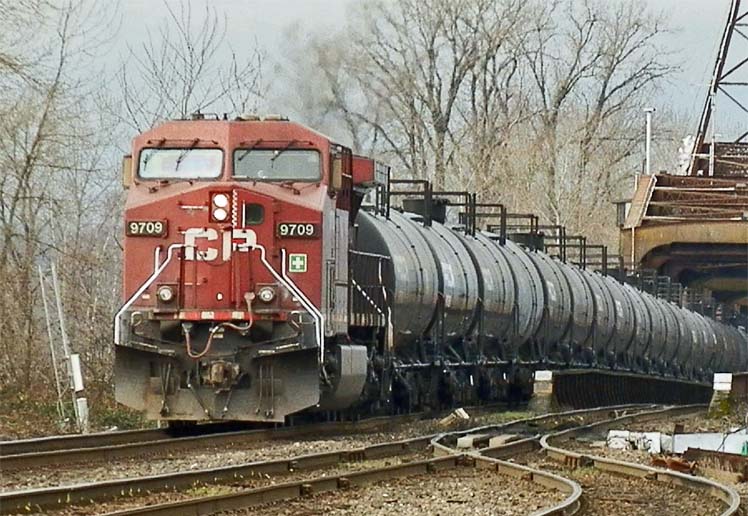
milepost 109.4 in Pitt Meadows - 25 Jan 2019 Andy Cassidy ☀1.
Victoria Vancouver Island British Columbia - The British Columbia (BC) government will be in court this month seeking the authority to
regulate shipping of crude oil across the province.
It expects stiff opposition from Alberta and Ottawa, who say this is exclusively a matter of federal jurisdiction.
But BC has met with another pocket of resistance, rail companies are refusing to comply with provincial orders to report how much oil they are moving through
the province.
That leaves BC in a bind, it cannot regulate what it cannot count.
The NDP government has promised to use every tool in its toolbox to stop the expansion of the Trans Mountain pipeline expansion project.
The BC Court of Appeal, in a hearing that starts 18 Mar 2019 is being asked to weigh in on whether BC has the constitutional jurisdiction to enact a draft law
that would give the provincial government the authority to regulate heavy oil transport by issuing permits.
BC does not single out Trans Mountain in its reference case.
It wants the ability to limit shipping by any means, including rail.
But the three companies that transport oil by rail through BC don't want to answer to the provincial government.
Canadian National (CN), Canadian Pacific (CP), and Burlington Northern Santa Fe (BNSF) are all fighting an order, issued last September by the provincial
director of the Environmental Management Act, to report both the volume of oil they move and the routes they've used for transport.
BC says the information is needed to help it with oil spill response planning.
"We are frustrated. These very same rail companies release this information in neighbouring Washington State," BC Environment Minister George Heyman
said in an interview.
Washington State then posts the information in quarterly reports, so that the public knows how much oil is moving through their state, by rail or
pipeline.
"The rail companies appear to be more interested in their corporate interests than in giving us the information we need to protect the health and safety
of British Columbians in their communities," Mr. Heyman said.
The three rail companies joined forces in an appeal to the province's Environmental Appeal Board.
They argued they are federally regulated and BC lacks the constitutional authority to over-ride that jurisdiction.
This argument is at the heart of the reference case, whether BC can control the movement of goods across provincial borders.
In the hearing conducted late in 2018 by the Environmental Appeal Board, the railways said the information that BC wants is kept confidential by Ottawa's
authority, and that if the data was public, it could be used to plot a malicious attack on the railways.
The railway companies cite the Lake Megantic rail disaster, the 2013 derailment of a train carrying crude oil that killed 47 people and caused serious
environmental damage to the Quebec town and surrounding waterways.
The incident demonstrates, they argue, what could happen if there was a terrorist attack on a railway if information on shipments was publicly
revealed.
But that argument can be turned on its head.
BC wants the information because it intends to create geographically-tailored spill response plans to fill in gaps it sees in the federal regime.
In the hearing, the province's lawyers said the intent is to publish high-level information to the public about shipments that have been
completed.
The shipments would be combined, so no one railway's information would be revealed, just as Washington State does.
But the arms-length Environmental Appeal Board concluded that there is a "reasonable basis" for the railways' objections and refused to enforce the
orders while an appeal is being heard.
"The Panel agrees that there is no emergency preparedness void that must be filled in the province. The transport of the dangerous goods is covered by
federal legislation and by federal directions," they wrote in a 3 Dec 2018 interim decision.
A final ruling has not been made.
British Columbians have reason to question federal oil spill response planning, given the gaps that were revealed in the Marathassa and Nathan E. Stewart
spills.
BC and Ottawa don't agree on the science of what happens when heavy oil spills into a marine environment, so they cannot agree on what a clean-up plan should
look like.
Whether by oil, rail, or by sea, the BC government says it needs to exert additional oversight.
The Court of Appeal is likely BC's last real shot at stopping the Trans Mountain pipeline expansion.
The setback at the Environmental Appeal Board suggests it has not yet nailed down a winning case.
Justine Hunter.
provisions in Section 29 of the Canadian
Copyright Modernization Act.

